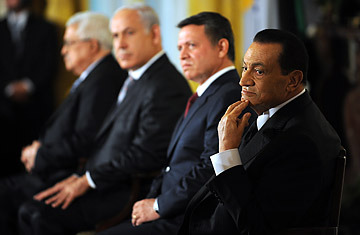
From right: Egyptian President Hosni Mubarak, Jordanian King Abdullah II, Israeli Prime Minister Benjamin Netanyahu and Palestinian President Mahmoud Abbas listen to U.S. President Barack Obama make a statement on Middle East peace at the White House on Sept. 1, 2010
The flood of classified U.S. diplomatic cables released on Sunday by WikiLeaks threatens to further undermine Egypt's already questionable role as a neutral mediator between Palestinian factions, embarrass the U.S. in one of its most important Middle Eastern allies and expose the authoritarian regime of President Hosni Mubarak to more criticism in the aftermath of a parliamentary election this past weekend that was marred by widespread accounts of fraud and abuse.
For Cairo, the country's current preoccupation with an election that fell on the same day as the WikiLeaks disclosure may serve to distract the public for the time being. Egyptian newspapers on Monday devoted some attention to the leaks, but focused on revelations regarding their neighbors and other countries — not Egypt. Meanwhile a Foreign Ministry spokesman declined to comment on the documents' impact — indicating that he was not up to speed on the details and was currently in Libya. But inevitably, analysts say, details of Egypt's hard-line stance on Hamas, as well as its close cooperation with Israel, will provide fresh fodder for Egypt's largest opposition group, the Muslim Brotherhood, which suffered serious losses in the weekend's poll.
One of Brotherhood's strongest talking points against Mubarak's deeply unpopular regime has been its allegedly close relationship with Israel — a neighbor still widely vilified by the Egyptian public. Thanks to the diplomatic cables, Egypt may now have to account for fresh details regarding its cooperation with the Jewish state, as well as its role as a regional peace broker. "I think the most important thing is the link between these documents that explain everything and the crackdown on democracy and the crackdown on the Muslim Brotherhood," says Essam al-Erian, a member of the Brotherhood's politburo. "If there was a democracy in Egypt and the Muslim Brotherhood became more powerful, this would threaten this good relationship between Egypt and the Israelis."
The Brotherhood now has a new trove of information to mine. For example, a February 2009 cable from Margaret Scobey, the U.S. ambassador in Cairo, to Secretary of State Hillary Clinton describing intelligence sharing between Egypt and Israel may add further credence to allegations that cooperation between the two states led to an Israeli hit on a Palestinian target in Gaza earlier this month — something Egypt vehemently denies. Potentially more damning is a June 2009 cable from the U.S. embassy in Tel Aviv, which reveals that Egypt had been consulted about Israel's air and land assaults on Gaza prior to the attack the previous winter.
What may be more worrying to the Egyptian government, however, is a blow to the state's credibility as a regional peace broker. For years, Mubarak's regime has presented itself as the only diplomatic actor capable of resolving the 2007 split between Palestinian factions Hamas and Fatah that left Hamas in control of Gaza and Fatah in control of the West Bank. Palestinians deem reconciliation critical to the success of any peace deal with Israel, but many accuse Egypt of being a biased mediator and therefore unfit for the job. The disclosed documents appear to leave little doubt as to where Egypt stands.
"Mubarak hates Hamas and considers them the same as Egypt's own Muslim Brotherhood, which he sees as his own most dangerous political threat," Scobey said in the February 2009 cable. Another cable detailing a meeting between Egyptian intelligence chief Omar Suleiman and General David Petraeus, of the U.S. Central Command, in the same year revealed Suleiman was pessimistic about prospects of reaching a deal. "I consider myself a patient man, but I am losing patience," Suleiman told Petraeus. He said Egypt was committed to undermining Hamas and building popular support for Palestinian President Mahmoud Abbas in the West.
"Hamas will use that [cable] to launch a campaign against Egyptian diplomacy and accuse Egypt of playing a disruptive role in the continued reconciliation," predicts Emad Gad, an international-relations analyst at al-Ahram Center for Political and Strategic Studies in Cairo. "They can harm the Egyptian mediation role."
At the same time, the leaks revealed a sometimes tense relationship between the U.S. and one of its staunchest regional allies. "The Egyptians have long felt that, at best, we take them for granted, and at worst, we deliberately ignore their advice while trying to force our point of view on them," Scobey briefed Clinton in the February 2009 cable. The ambassador describes the second largest recipient of U.S. military aid as "very often a stubborn and recalcitrant ally. In addition, Egypt's self-perception as the 'indispensible Arab state' is contingent on Egyptian effectiveness on regional issues, including Sudan, Lebanon and Iraq." She suggested that Clinton praise Egypt's importance in regional affairs.
Other details, like an unfavorable description of Egypt's Foreign Minister, may simply prove embarrassing. Egypt's Foreign Ministry told TIME on Monday that it was still weighing the documents and was not yet prepared to respond. But in a speech broadcast from Washington, Clinton told reporters that, although the cables were damaging and potentially life-threatening in some cases, U.S. foreign policy was not dictated by the documents and would not be seriously impacted by the megaleak. Responding to a reporter's question, she said, "I am confident that the partnerships and relationships that we have built in this Administration will withstand this challenge."
